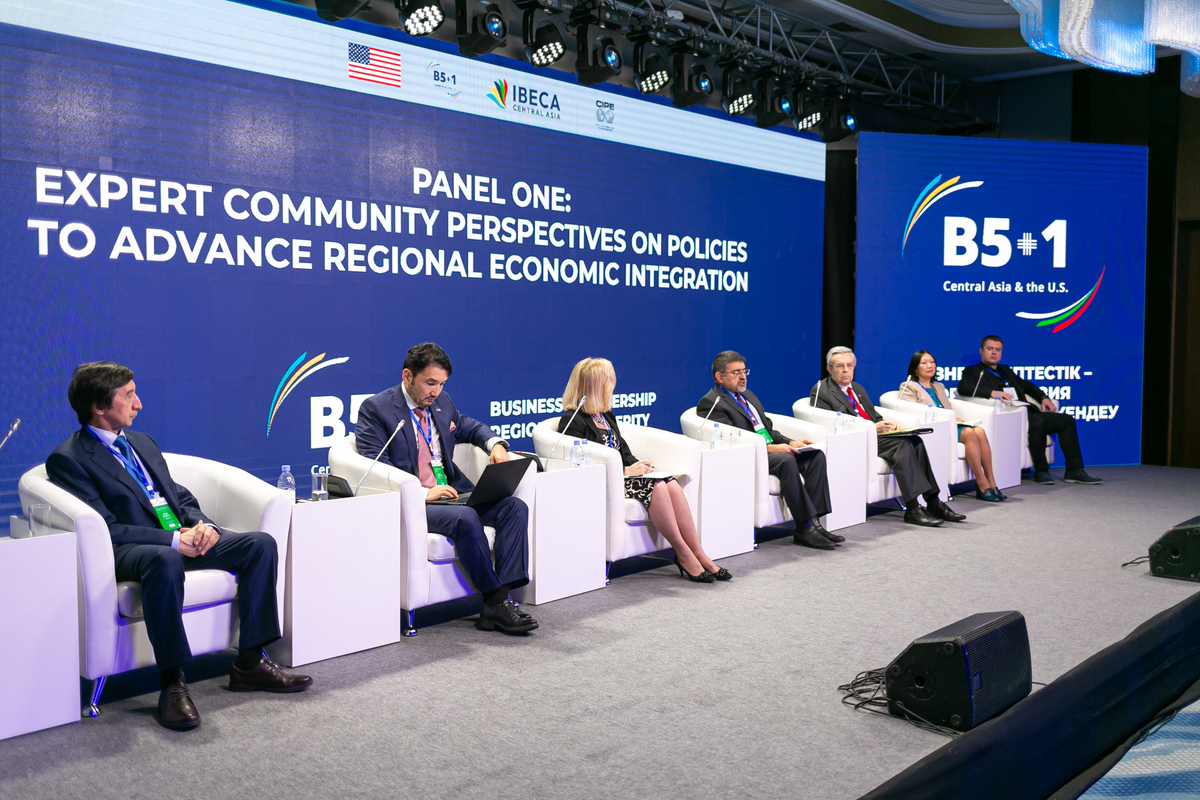ASTANA – Enhancing intra-regional connectivity among Central Asian countries depends on strengthening connections within each of the five countries, said Kamran Bokhari, the senior director of the Eurasian Security and Prosperity portfolio at the New Lines Institute, in a recent interview for this story.

Kamran Bokhari delivers remarks at the Business 5+1 (B5+1) Forum in Almaty on March 14-15. Photo credit: CIPE.
Bokhari is an expert in geopolitics and international security. He served as a Central Asia studies course coordinator in the U.S. State Department’s Foreign Service Institute and has been a senior consultant at The World Bank. He has experience of working in the private sector intelligence space and authored books on democratization, policy making and intelligence analysis.
Bokhari was among the key speakers at the inaugural Business 5+1 (B5+1) Forum in Almaty on March 14-15, which was a cornerstone event within the Improving the Business Environment in Central Asia (IBECA) program by the Center for International Private Enterprise (CIPE), emphasizing the vital need for connectivity and collaboration among the region’s five nations.
“Among the biggest obstacles to geoeconomic integration of Central Asia is the fact that connectivity among the countries of the region has a long way to go,” he explained. “In order to maximize trade with one another the region’s five nations will need to develop robust transnational mechanisms to harmonize regulations, customs procedures, and arbitrate disputes. To enable the ferrying of goods and people across the region Central Asian countries will need to focus on both hard and soft infrastructure development.”

Business 5+1 (B5+1) Forum in Almaty on March 14-15. Photo credit: CIPE.
He noted that several speakers highlighted the need for the creation of an ecosystem involving the government, private sector and civil society that would serve as enablers of regional economic integration at the forum.
“The need to forge a regional economic architecture based on learning from other models (European Union, ASEAN and other models) was stressed upon. How landlocked Central Asia could be turned into a land-linked region was another important topic that was explored,” he said.
The expert spoke about the current level of cooperation between the United States and Central Asian countries in terms of economic development and regional integration.
“When it comes to economic development and regional integration there is a great deal of room to improve cooperation between the United States and Central Asian countries. Much of it depends upon the regional countries engaging in reforms to attract greater western investments. Washington can provide considerable assistance in instituting these reforms. However, the regional countries must own the process for the region to achieve its true potential,” he said.

Photo credit: CIPE.
“In the wake of Russia’s invasion of Ukraine, the United States and its allies have begun to prioritize Central Asia, which is a highly positive development,” Bokhari stressed. “This process, however, is still at an embryonic stage and a great deal of ground needs to be covered. The outcome of the conflict in the South Caucasus has created a rare opportunity for the west to forge greater connectivity with the region via the Trans-Caspian Corridor initiative. The Critical Minerals Dialogue launched in February by the Biden administration is a key foundation upon which a reliable supply chain for rare earth elements can be built.”
The multilateral institutions also contribute to facilitating economic integration efforts in Central Asia.
“The Central Asia Regional Economic Cooperation (CAREC) program provides for a strong precedent for a greater role for multilateral institutions vis-à-vis efforts towards regional economic integration. Washington through USAID and DFC can complement the work being done by CAREC. There is also room for the United States working through the United Nations, World Bank, and the IMF to strengthen existing efforts to enhance multimodal transportation networks and augment energy and trade security,” he said.
Bokhari also took a note of the ongoing reforms in Kazakhstan mentioning President Kassym-Jomart Tokayev’s efforts to decrease the state’s footprint in the economy as “the right course of action.”
“It is crucial to stay the course on this trajectory, which can be terribly challenging given the unintended consequences, and other factors, unemployment in the short-term. Likewise, reducing state subsidies increases costs of living, which runs the risk of triggering discontent among the citizenry. Kazakh policy- and decision-makers will need to find the right balance between instituting reforms that will contribute to sustainable growth and limiting any potential short-term fallout for the public,” he said.
The expert believes that as the region’s largest economy, it behooves Kazakhstan to take the lead towards regional integration. Through a close working relationship with Uzbekistan “Astana can rally the other three smaller Central Asian nations towards an architecture that ensures security and stability.”
“This is a critical first step towards ensuring economic development in these most uncertain of times given the transformations underway in each nation as well their collective strategic environs. While each country will continue to have its bilateral relations with different players who are stakeholders in the region, Kazakhstan can use its international clout to emphasize a multilateral component when it comes to relations between the region and the outside world,” he said.
The interview was organized with the support of the Center for International Private Enterprise (CIPE), non-profit organization in Washington, D.C., the United States.


